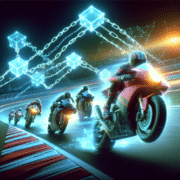From Track to Blockchain: The Next Generation of Moto Racing
From Track to Blockchain: The Next Generation of Moto Racing
In recent years, blockchain technologyA decentralized and distributed ledger that records all transactions across a network of computers. It is the underlying... More has been making waves in various industries, and the world of moto racing is no exception. With its decentralized and transparent nature, blockchain is revolutionizing the way races are conducted, from track to blockchain. Let’s dive deeper into how blockchain is shaping the next generation of moto racing.
Decentralized Racing Platforms
- Decentralized Autonomous Organizations (DAOs): DAOs are becoming increasingly popular in the moto racing industry. They enable fans and stakeholders to have a direct say in the governance of racing events, ensuring transparency and fairness.
- Smart Contracts: Smart contracts are being used to automate various aspects of racing, such as ticket sales, sponsorships, and prize distribution. This eliminates the need for intermediaries and reduces the risk of fraud.
- Tokenization: By tokenizing racing assets, such as motorcycles and gear, fans can have a stake in the success of their favorite riders. This also opens up new revenue streams for teams and riders.
Enhanced Fan Engagement
- Decentralized Social Media Platforms: Blockchain-powered social media platforms are providing fans with a direct line of communication with riders and teams. This fosters a sense of community and loyalty among fans.
- Reward Systems: Through blockchain-based reward systems, fans can earn tokens for participating in polls, contests, and other engagement activities. This incentivizes fans to be more active and supportive of their favorite riders.
- Virtual Reality Experiences: Blockchain technology is enabling the creation of immersive virtual reality experiences for fans, allowing them to experience races from the comfort of their own homes. This opens up moto racing to a global audience.
Transparent and Secure Data Management
- Data Integrity: By storing race data on a blockchain, the integrity of the data is ensured, preventing tampering and manipulation. This promotes fair competition and trust among stakeholders.
- Fraud Prevention: The transparency and immutability of blockchain technology make it difficult for fraudulent activities to occur, such as doping scandals or race fixing. This protects the credibility of the sport.
- Secure Payments: Blockchain enables secure and instant payments between stakeholders, such as riders, teams, sponsors, and fans. This streamlines financial transactions and reduces the risk of payment disputes.
From track to blockchain, the next generation of moto racing is set to be more transparent, engaging, and secure than ever before. As blockchain technology continues to evolve, we can expect to see even more innovations in the world of moto racing.











